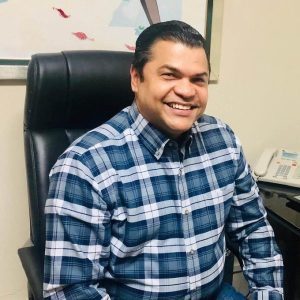
National District Deputy Tobias Crespo warns of a setback in advances in the organization of the transit and traffic structures in the country. Patricia Solano and Diana Lora interviewed him on new developments underway by the Abinader administration to improve traffic nationwide.
Tobias Crespo was the director of the Transit Office (DGTT) from 2004 to 2010. He went on to draft the Traffic and Transit Law 63 that was passed in 2017 and is now being implemented. But in the interview on 16 February 2022 for La Cuestion (Super7FM) he criticized that the government has been paying subsidies to the private bus companies that have been handpicked to operate prime bus routes and have partnered with the government through the trust mechanism. He denied that Law 63-17 orders the corridors to operate with trust mechanisms.
He said the Abinader administration is carrying out “a counter-reform” of the transit sector. He said this is being orchestrated from the Ministry of the Presidency and the National Transport and Transit Institute (Intrant) office. At the start of his presidency, President Luis Abinader appointed a former top executive of the infamous Fenatrado trucking syndicate to head the Intrant. The former president of Fenatrado is in jail for homicide.
Crespo during the radio program criticized the trend towards eliminating of the Omsa bus company that has buses that offer long route bus service for fares of RD$15. The government has already allotted to transport companies the operation of corridors with fares of RD$35. The government has allocated the Núñez de Caceres bus route to Conatra business group and the Winston Churchill bus route to the Mochotrans business group. Both are former syndicated transport groups known for their vandalic activities in the past to control public transport routes.
Crespo says the Núñez de Cáeres and Churchill contracts set too optimistic levels of passenger usage that are now not being met and are being compensated by the state. He compared this reality to the much criticized shadow toll that in the Samana toll road.
Crespo insisted that if there is a subsidy it should go to the passenger not to the provider of the service. He says subsidies to the provider create corruption, economic distortion and cartels.
He criticized that the new transit authorities estimate passenger levels that are not real to then pay subsidies. He called this more of the “peaje sombra” or shadow payment in the form of allowances for fuel, etc. The shadow payment was much criticized in the Samana toll road, a first private concession road.
“We agree on the corridors, but not that Intrant is obligating the participants to sign on to the trust modality. The trust is an option not an obligation. The law obliges people to be a company and operate as such with health and pension plans for drivers. He said the corridors need to guarantee frequency of service and fare price.
He remarked Intrant corridors operate under the Fimovil mechanism that is tied to the Mobility Trust managed from the Ministry of the Presidency. He criticized the government has not provided pensions for drivers on the routes displaced that are over 60 years. He also criticized that the vehicles removed from the Núnez de Caceres and Churchill routes are now operating on other routes. He said the law contemplates the scapping of these vehicles to decongestion the city.
In the interview, Crespo also comments on the proposal for a points system for driver licenses. He criticized that the government wants to pass to a private entity, through the trust modality, the inspection of vehicles (la revista). He said Law 63-17 contemplates certifying private workshops to carry out the inspections. The Public Private Alliance has given green light to a private company that under the trust mechanism would invest US$100 million in workshops nationwide to carry out the service of inspecting the vehicles for physical, mechanical and environmental state. Crespo said this is not contemplated in the law. The intention of the law was to reduce to 30% the discretionality of the inspector and that a machine turn out 70% of the inspection.
.
Listen to the interview:
La Cuestion – 41:45 Minute mark
17 February 2022

